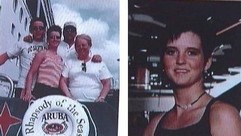Scared Monkeys Welcomes Richard as Contributing Editor: Discussing his thoughts on Missing Persons
Posted in: Amy Bradley,Bloggers,Child Welfare,Crime,International Safe Travels Foundation,Internet,Missing Persons,Natalee Holloway
Scared Monkeys asked me to do some occasional articles on the general phenomenon of missing people, and on individual cases. Needless to say, I’m honored and pleased to do so. Being asked to do these articles does not imply endorsement of my thoughts on Natalee Holloway or any other missing person case. I am no expert in this area and make no claim to be one.
Those people who have read my posts in the last two years know that I work with the family of Amy Bradley, missing in the Caribbean since March 1998. I also do volunteer research for International Cruise Victims, which is dedicated to promoting safety on cruise ships and alerting the public to the difference between the benign image the cruise industry presents and the level of crime that actually exists. And I have done similar Internet research for the International Safe Travels foundation as time has allowed.
This weekend the world is awaiting the revelation of the fate of Harry Potter and other  characters in that series. People are lined up to buy the last book; enterprising or unscrupulous individuals are competing to release the details of what happens; and the media are prepping us for a full-scale assault on bookstores by fans, money in hand, raging to know who lives and who dies.
characters in that series. People are lined up to buy the last book; enterprising or unscrupulous individuals are competing to release the details of what happens; and the media are prepping us for a full-scale assault on bookstores by fans, money in hand, raging to know who lives and who dies.
I wonder how many of these people will give a thought to the plight of families in the “real” world who want to know the same thing about their loved ones? Harry Potter is fiction; the agony of these families is not.
According to Crime Library , 2,300 Americans are reported missing each day. I don’t know if that’s a running total or if it is the number of new cases. This source also says that 150,000 Americans were reported missing in 1980; the latest figure is 900,000. To some extent, the higher figure may indicate that more attention is being paid to these people. But whatever the accurate number may be, multiply it by the grief that any family must feel and be daunted at the thought.
Anyway, exact numbers are not important; the despair of the families is. These essays are not about me, but I want to share one experience. I began my interest in this field when Chandra Levy went missing in 2001, a case that gripped the nation then and that remains unsolved. Before that I had never thought much about missing people; it was something outside of my experience, and had never happened to anyone that I knew.
Susan Levy, shown in her Modesto home with a portrait of her daughter Channdra
As I became interested in Chandra’s case, it occurred to me that there must be other missing people as well. So one Saturday morning I went to the office where I was working and did random Internet searches for missing people. Within half an hour I had seen more than I ever wanted to; hundreds – hundreds! – of smiling photos were on file, each a life that had value, each a life that may or may not have been ended, each a life that now was shrouded in mystery. The answers were out there, but I didn’t know them.
One night, soon after, I had a dream that I still don’t like to think about. In the dream, I realized that I had the power to “find” ten missing people … no idea why it was ten and not another number, but that’s what it was. I had a great feeling of joy at being able to do this, and started making up a list. Then I realized that to give ten families the answer they wanted meant to turn down thousands of other families. It was like those classroom exercises: you have ten people on board a sinking ship, and a boat that can take six. Who do you save? Who do you let die? In this case, what families do you help? How do you decide? Whose claim is the greatest?
At that point it was as though I were surrounded by swirling fallen leaves, a familiar image to New Englanders in autumn, as though the spirits of the missing and dead were crying out for attention. So many fallen leaves; so many desperate spirits; and I could do so little, help so few. By and by the voices subsided and faded away in a kind of despair, and I woke up with tears in my eyes.
Getting back to the subject, there’s a lot of talk about media partisanship in which missing-person cases get coverage. The “rich white girl” becomes a national cause, while her female counterparts of other ethnic or economic strata get ignored … not to mention her male counterparts. Or so the argument goes. It might be worth noting here that according to Crime Library, somewhat more than half of missing people are male.
I’m willing to concede that life is unfair, and that the media might give certain stories more play than others. What else is new? If an athlete or movie star is caught speeding, has a fight, uses drugs or does nothing in particular, he or she gets more media coverage than I do. If Lindsay Lohan or Sean Penn were to vanish tomorrow, the press would go crazy. If it happened to me, nobody would know and only a few would care. So what?
My concern is with what’s left behind, in a way, when someone goes missing. Whether high or low in the world’s esteem, the family of a missing person must go through a peculiar kind of icy hell, one that probably cannot be realized by anyone not in that situation. Any such case deserves our sympathy just because we are human, and demands action. Hence we not only should speak out, we must.
My contact at International Safe Travels tells me that as far as she can find out, there is no one agency of the U.S. government that keeps track of missing people abroad. There is no master list, as it were. There is information on Americans who die abroad
(http://travel.state.gov/family/family_issues/death/death_594.html), but no overall data on the missing. I find this unbelievable. I’d like to write about it next time.
Return to: Scared Monkeys Welcomes Richard as Contributing Editor: Discussing his thoughts on Missing Persons


Social Web